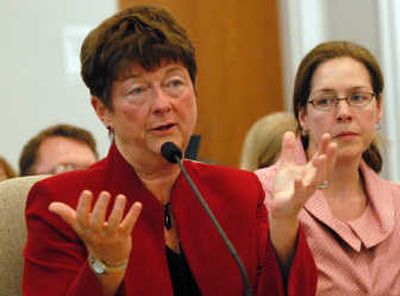Salary overhaul sought for teachers

OLYMPIA – Washington’s schools chief on Monday called for a “major restructuring” of how teachers are paid, saying that new teachers need more support and experienced teachers need incentives to stay.
“The quality of teachers is the bottom line in student improvement,” said Superintendent of Public Instruction Terry Bergeson, who’s seeking re-election to a fourth term after a recent vote of “no confidence” from the state teachers union. Teacher training and pay, she said, “is the key investment that is going to affect the children.”
Bergeson was speaking to the state’s task force on school funding, which has been working for months to revamp a system that she said is leaving many school districts “on the brink of financial disaster.”
“We’ve got a broken system, in many ways,” Bergeson said.
By the end of the year, the task force will recommend changes to state lawmakers, several of whom are already members of the group. Among them: Senate Majority Leader Lisa Brown, D-Spokane.
Bergeson is also calling for more money for struggling students and those learning English as a second language. Spokane schools, she said, are a model for helping English-language learners. But she argues that the state – not local taxpayers – should be picking up the extra cost of helping those kids.
Virtually all of the changes would require more money than schools are getting now.
“This is a challenge to the Legislature: Are you willing to support the work you’re asking us to do?” 14-year teacher Holly Koon asked lawmakers.
What’s the price tag for taxpayers? No one knows yet. Bergeson said in an interview that the panel asked her to propose a direction, with the costs to be debated in the coming months.
“There’s no question it will be a substantial amount of money,” she said. But she also said that major reforms like she’s proposing are likely to take six to eight years. Districts right now are just struggling to pay for diesel, electricity and other essentials, she said.
“You don’t get broken this way overnight and we’re not going to solve it overnight,” she said. And current staff, she said, would likely be grandfathered in under the current pay structure if they wish.
Here’s some of what Bergeson’s proposing:
•More staff: There are too few teachers and other staff for the number of students, Bergeson says. In many cases, classes are unmanageable and students lack personalized learning. A lower ratio is particularly key, she said, in lower grades and high-poverty areas.
•Linking salaries to performance: Bergeson wants “salary recognition for demonstrated expertise.” The system would be pegged to teachers’ professional certification requirements, with a longer series of salary increases before teachers max out. Bergeson also wants to create a new “leader” pay scale for expert teachers who want to stay in the classroom and mentor other teachers.
•Better pay: Bergeson said she’s waiting for a state Institute for Public Policy report this fall before specifying how much base pay teachers should get. But it should be more, she said.
•More librarians, school nurses, counselors and others.
•More professional development: Instead of limiting most new-teacher help to the first year, Bergeson wants to extend that to two. And she wants to expand the number of state-paid professional-development days from two to 10.
•Helping low-income schools: Bergeson wants to revamp the state’s “Learning Assistance Program,” which pays for more teachers in impoverished areas. It’s nowhere near enough, she said. Among the changes: She wants state-paid tutoring for much smaller groups of students.
•English-language learners: Bergeson cited Spokane Public Schools as an example of how to help these students. The state provides $846,000 a year for these programs in Spokane; the district provides nearly double that. The resulting intense help has led to dramatic increases in test scores in reading and math, she said.
The state teachers union, which has clashed with Bergeson over testing, seems wary of the new proposal. Mary Lindquist, president of the Washington Education Association, has said that better schools won’t come from merely “rearranging the dollars” paid to teachers.
“We need to pay our teachers competitively. That means higher base salaries. That’s the real issue,” union spokesman Rich Wood said Monday. An average teacher here, he said, earns $3,000 a year less than the national average.
“There are a lot of different ideas for changing the way teachers are paid,” he said, “but most have not been proven to work any better than our current system.”
The meeting continues today, with other groups proposing their own school-funding plans.